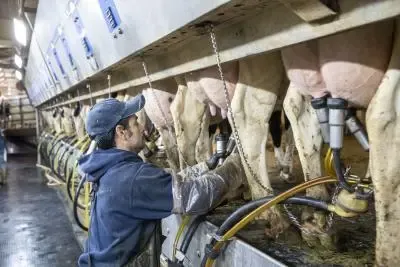UK Prohibits Personal Imports of Meat and Dairy from All EU Nations

Synopsis
Key Takeaways
- The UK has banned imports of meat and dairy from all EU countries.
- This action is due to the spread of foot-and-mouth disease.
- Travellers will face fines for non-compliance.
- The ban includes various meat and dairy products.
- The measure aims to protect British livestock and food security.
England, April 12 (NationPress) The government of the United Kingdom has announced an extension of its prohibition on personal imports of meat and dairy products to cover all European Union (EU) nations as outbreaks of foot-and-mouth disease continue to spread across the continent.
Effective from Saturday, individuals entering the UK will be prohibited from bringing in cattle, sheep, goats, pig meat, and dairy items from any EU country for personal consumption.
Prohibited items include sandwiches, cheese, cured meats, raw meats, and milk, regardless of their packaging or whether they were acquired at duty-free shops, as reported by the Xinhua news agency.
The aim of this regulation is to safeguard the health of British livestock, ensure the safety of farmers, and maintain the food security of the UK, according to government statements.
Travellers caught with these forbidden items will have to either surrender them at the border or face confiscation and destruction. In serious cases, offenders could incur fines reaching up to 5,000 pounds (6,550 US dollars) in England.
Earlier this year, the UK had already restricted personal imports of cattle, sheep, other ruminants, and pig meat, along with dairy products from Germany, Hungary, Slovakia, and Austria due to confirmed foot-and-mouth disease outbreaks in those regions. The new regulations now encompass all EU countries.
While foot-and-mouth disease poses no threat to humans and there are currently no reported cases in the UK, it is a highly contagious viral illness affecting cloven-hoofed animals such as cattle, sheep, pigs, wild boar, deer, llamas, and alpacas.
The disease's outbreak in Europe poses a significant risk to farming operations and livestock health, leading to considerable economic losses due to decreased productivity in affected animals and limited access to international markets for meat and dairy products.










